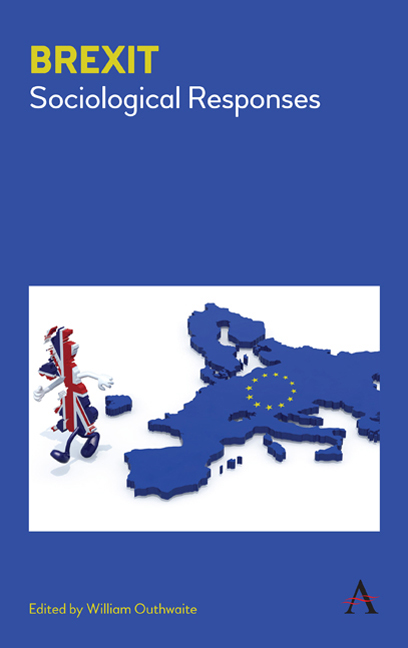Book contents
- Frontmatter
- Contents
- Preface
- Section 1 HOW DID IT HAPPEN?
- Chapter One The Increasing Inevitability of That Referendum
- Chapter Two Vox Populi: Nationalism, Globalization and the Balance of Power in the Making of Brexit
- Chapter Three Exit from the Perspective of Entry
- Chapter Four Brexit, Sovereignty and the End of an Ever Closer Union
- Section 2 THE POLITICS OF BREXIT
- Section 3 PROSPECTS FOR/ AFTER BREXIT
- Notes on Contributors
- Index
Chapter Four - Brexit, Sovereignty and the End of an Ever Closer Union
from Section 1 - HOW DID IT HAPPEN?
Published online by Cambridge University Press: 10 January 2018
- Frontmatter
- Contents
- Preface
- Section 1 HOW DID IT HAPPEN?
- Chapter One The Increasing Inevitability of That Referendum
- Chapter Two Vox Populi: Nationalism, Globalization and the Balance of Power in the Making of Brexit
- Chapter Three Exit from the Perspective of Entry
- Chapter Four Brexit, Sovereignty and the End of an Ever Closer Union
- Section 2 THE POLITICS OF BREXIT
- Section 3 PROSPECTS FOR/ AFTER BREXIT
- Notes on Contributors
- Index
Summary
‘Let's not beat around the bush’, the German chancellor, Angela Merkel, said in response to the British decision to leave the European Union (EU), ‘today marks a watershed for Europe’ (Delcker 2016). For some six decades, and numerous setbacks notwithstanding, Europe's path has been unidirectional: towards an ever closer and ever wider union. No longer. A series of crises that have seriously tested Europe's unity – the eurozone crisis, the EU- Russia conflict over Ukraine, the refugee crisis – was followed in June 2016 by an event that will result in an EU that is smaller in its geographic scope and weaker both economically and politically.
Nevertheless, political earthquakes also create unique opportunities for conceptual clarity. Exceptional challenges show which structures and political constellations are viable and which are not. Will there be an EU in five, or ten years from now that resembles what we have now? Will there be a UK in five, or ten years from now that resembles what we have today? I am less confident about the former than the latter, but both political entities face key challenges in the years to come, and in both cases they are centred around the contestation of sovereignty. In fact, Brexit both illuminates, and has been shaped by, competing understandings of sovereignty.
How Did We Get Here?
The UK has been rightly described as a reluctant member of the Union, with its antiquated political institutions and a strong attachment to parliamentary sovereignty, which sit uneasily with the continental project of a European federation in the making. Both the Conservative and the Labour Party have had an ambivalent relationship with Europe. It was thus primarily a party political gamble that the then British prime minister, David Cameron, took when he promised a referendum on the UK's EU membership.
Clearly, a referendum is a potent instrument of democratic control. It is also crude, because it can generate only simple results: ‘yes’, or ‘no’ are seldom satisfying answers in politics. What is more, resorting to the people as the highest arbiter of political conflicts is very much at odds with the distinctly British ideal of parliamentary sovereignty. And yet, it is hard to challenge its legitimacy in a constitutional monarchy that like all Western democracies conceives of the people as the ultimate source of power.
- Type
- Chapter
- Information
- BrexitSociological Responses, pp. 41 - 54Publisher: Anthem PressPrint publication year: 2017



